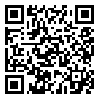BibTeX | RIS | EndNote | Medlars | ProCite | Reference Manager | RefWorks
Send citation to:
URL: http://jdisabilstud.org/article-1-3260-en.html
2- MA Student in Clinical Psychology, Yazd Branch, Islamic Azad University, Yazd, Iran
Abstract
Background & Objectives: Marriage stability requires awareness of the impact of your choices. The rising trend of divorce statistics and the existence of conflicts and disruptions in marital relationships have motivated researchers to find effective factors and suitable solutions to deal with the collapse of relationships. Disagreements between couples are inevitable, but what is important is the ability to resolve conflicts. Conflict resolution skills are used as a skill in most enrichment programs. Increasing learning of conflict resolution skills increases marital satisfaction and reduces marital disputes. Also, learning conflict resolution skills can increase resilience in people. Also, resilience directly plays a significant role in family functioning. One of the psychotherapy methods that can be effective as an intervention option in reducing marital problems is reality therapy. Reality therapy can effectively increase resilience and mitigate marital conflicts in couples. This research investigates the effectiveness of reality therapy on resilience and marital conflicts of couples referring to counseling centers in Yazd City, Iran.
Methods: The research method was quasi–experimental and employed a pretest–posttest with a 2–month follow–up design and a control group. The statistical population of the research included all couples who referred to counseling centers in Yazd in 2022 and 2023. The couples were selected voluntarily by an available sampling method, and 30 people were randomly divided into two control and experimental groups (15 people in each group). The criteria for including participants in the research were as follows: couples experiencing difficulties in marital relationships as diagnosed by the Family Counseling Center, a minimum of three years of marriage, and a conscious willingness to participate in the study. The exclusion criteria included participation in simultaneous educational sessions and absence from more than two therapy sessions for the experimental group. The research tools were the Connor–Davidson Resilience Scale (Connor & Davidson, 2003) and the Marital Conflicts Scale (Sanai, 2000). The experimental group received reality therapy during eight 1–hour sessions, and the control group did not receive any intervention. Subjects' consent to participate in the study was obtained. Before starting the treatment, a pretest was conducted for two groups, and the subjects were asked to complete the abovementioned questionnaires. After the treatment period, the experimental and control groups were given a posttest, and two months after the end of the intervention sessions, both groups were re–administered with the research tools, and the follow–up test was conducted. This study observed ethical standards including obtaining informed consent and ensuring the subjects' privacy and confidentiality. The research data were analyzed at two levels of descriptive and inferential statistics. Indicators such as mean, standard deviation, and charts were used at the descriptive level. The repeated measures analysis of variance and Bonferroni post hoc test were used at the inferential level. The data obtained were analyzed using SPSS version 26 at a significance level 0.05.
Results: The results showed significant effects of time, group, and their interaction on marital conflicts and resilience variables (p<0.001). The results indicated a significant decrease in the scores of marital conflicts and a significant increase in resilience scores in the posttest and follow–up compared to the pretest in the experimental group (p<0.001). While none of the mean differences in the control group were significant, the effect of the reality therapy intervention was confirmed for the variable of marital conflicts (p=0.005) and resilience (p=0.003) in the follow–up phase of the experimental group.
Conclusion: According to the results, reality therapy reduces marital conflicts and increases resilience. Therefore, reality therapy can improve marital conflicts and resilience in couples with marital problems.
| Rights and permissions | |
 |
This work is licensed under a Creative Commons Attribution-NonCommercial 4.0 International License. |



